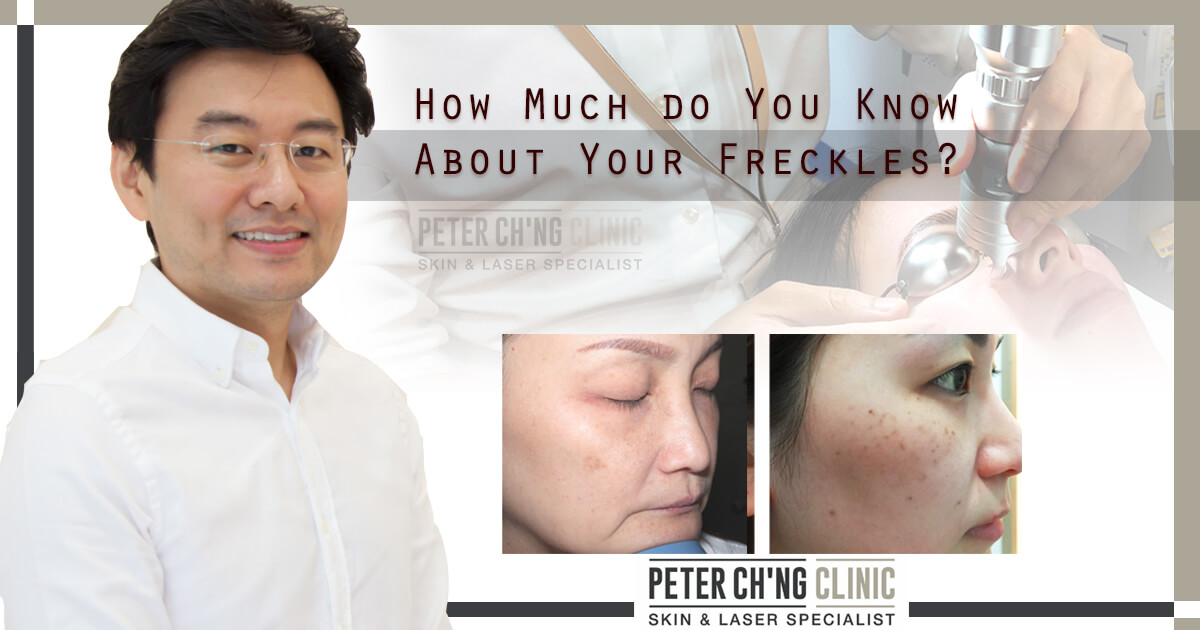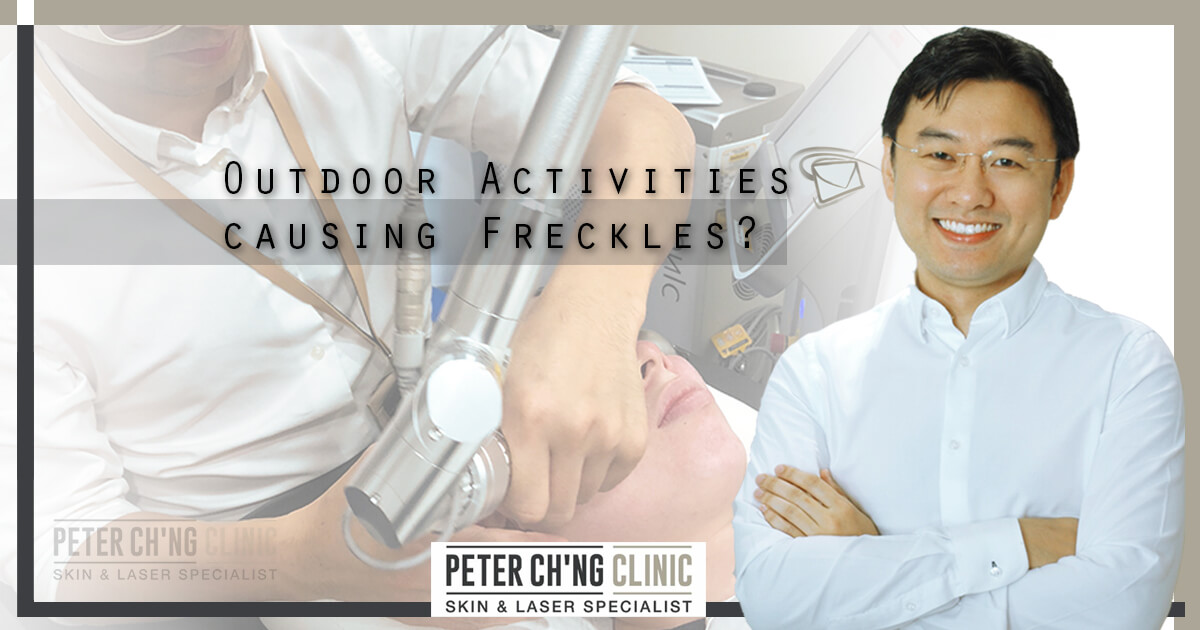Patient Mailbox: Age Spots Inevitable After 40?
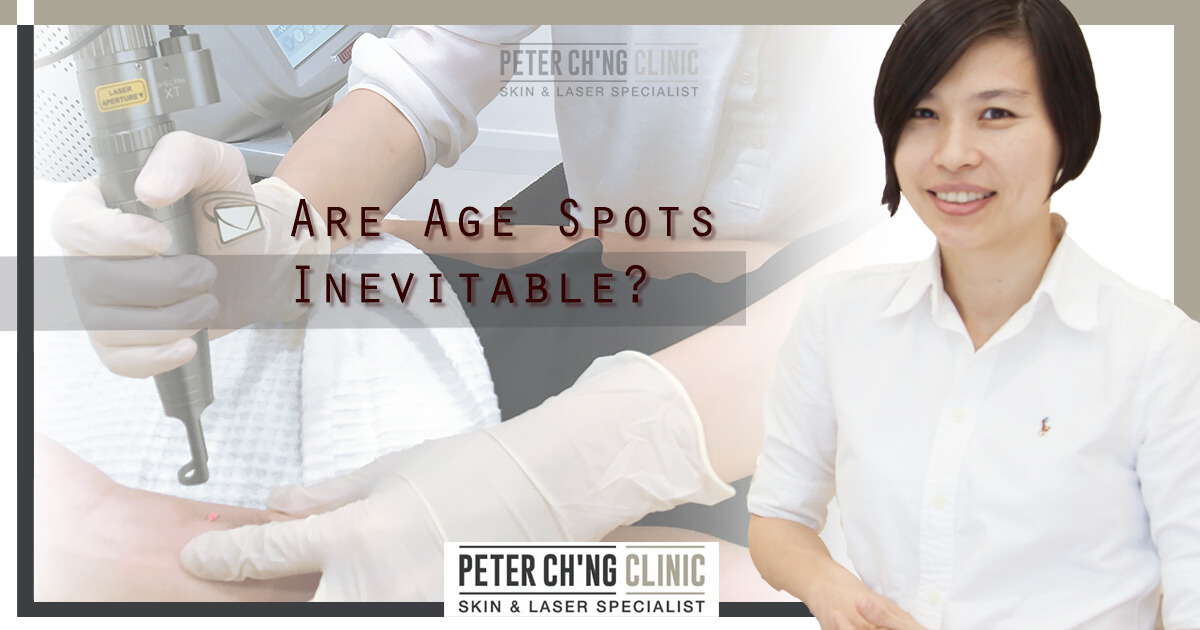
Hi! I’m Dr Loo Keng Shien.
Here's Episode 11 of the Patient Mailbox series, where we collect handpicked questions submitted by patients suffering from various skin diseases and condition, and personally answer them with our best efforts. I hope to help any one of you who face challenges from similar situations.
Editor’s Note: Dr Loo Keng Shien is a Consultant Aesthetic Physician with a special interest in Dermatology and Aesthetic Medicine. She has highly certified qualifications from the American Academy of Aesthetic Medicine, American Academy of Anti-aging Medicine, and in Practical Dermatology from Cardiff University. She currently practices at Peter Ch'ng Clinic Skin & Laser Specialist in Desa Park City.
Question:
Hi Dr Loo,
I’m Nassir, I have always tried my best to take care of my health and my fitness all these years, so that I don’t develop health problems or skin aging signs when I grow older.
However, now at my middle-aged years, I have noticed some spots on my face, and upon checking, I found them to be age spots. To be honest, I’m quite surprised because I rarely have any problems with acne or other skin condition so far.
I have tried some facial treatments at beauty and spa centres to get rid of age spots, but they didn’t work despite repeated treatments.
Are age spots, as their name suggests, really inevitable as we age? Is there a way to make them disappear?
Answer:
We can begin with answering this most common question about age spots:
Are age spots really inevitable as we age?
Age spots, also commonly known as liver spots, appear on our face as solar lentigines - patches of darkened skin caused by the accumulation of melanin (dark pigments) as a result of exposure to sunlight UV (ultraviolet) radiation.
These lentigines or spots are usually 2-20mm in macule area (area of discolouration).
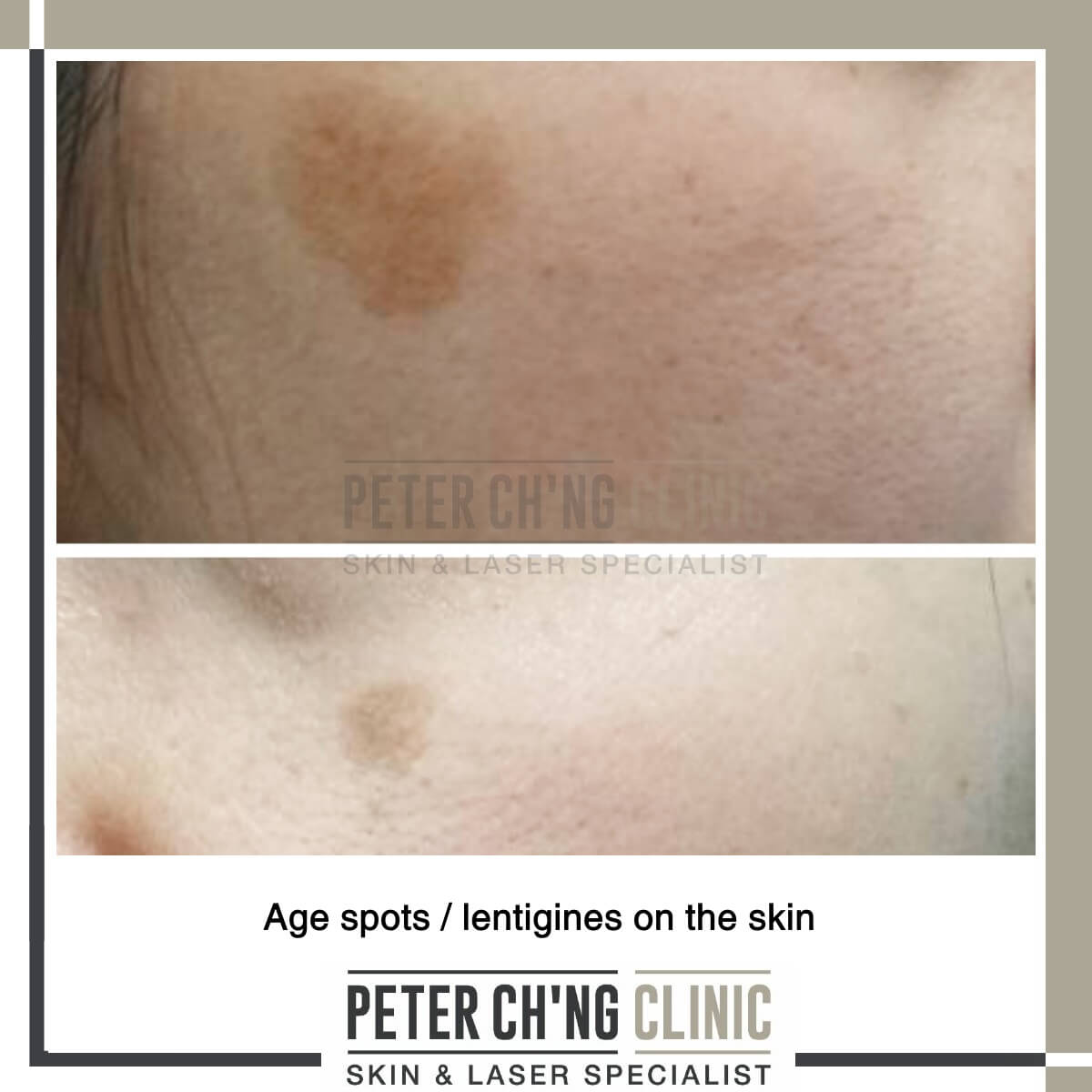
We can find age spots appearing in sun exposed area, like the back of our hands and our face. So through the years as we age, our skin is also exposed to sunlight for a longer period accumulatively, causing age spots to be more common in old age.
Age spots are generally harmless patches of dark skin pigmentation. However, because it is caused by UV radiation which can be harmful to our skin, it is important to differentiate them from precancerous or cancerous skin pigmentation.
*Editor's note: If you'd like to have a thorough check up on your skin pigmentation to know if they are harmful, you can always call us at +6011-22882299, WhatsApp us here, or book an appointment with Dr Loo here!
Preventing age spots
Since the main cause of age spots or liver spots is sunlight exposure and UV radiation, the straightforward and most important step in preventing the formation of these dark pigments on our skin is sun avoidance and protection.
Here are some tips to avoid sunlight or UV damage on our skin:
Sun avoidance
It is best to avoid outdoor activities or simply walking under the sun during the peak hours of sunlight radiation from 10am to about 3-4pm.
This is when the UV radiation from the sun is the strongest and can cause damages on our skin. If you have to be outdoor during these hours, make sure you practise the following.
Physical sunblock
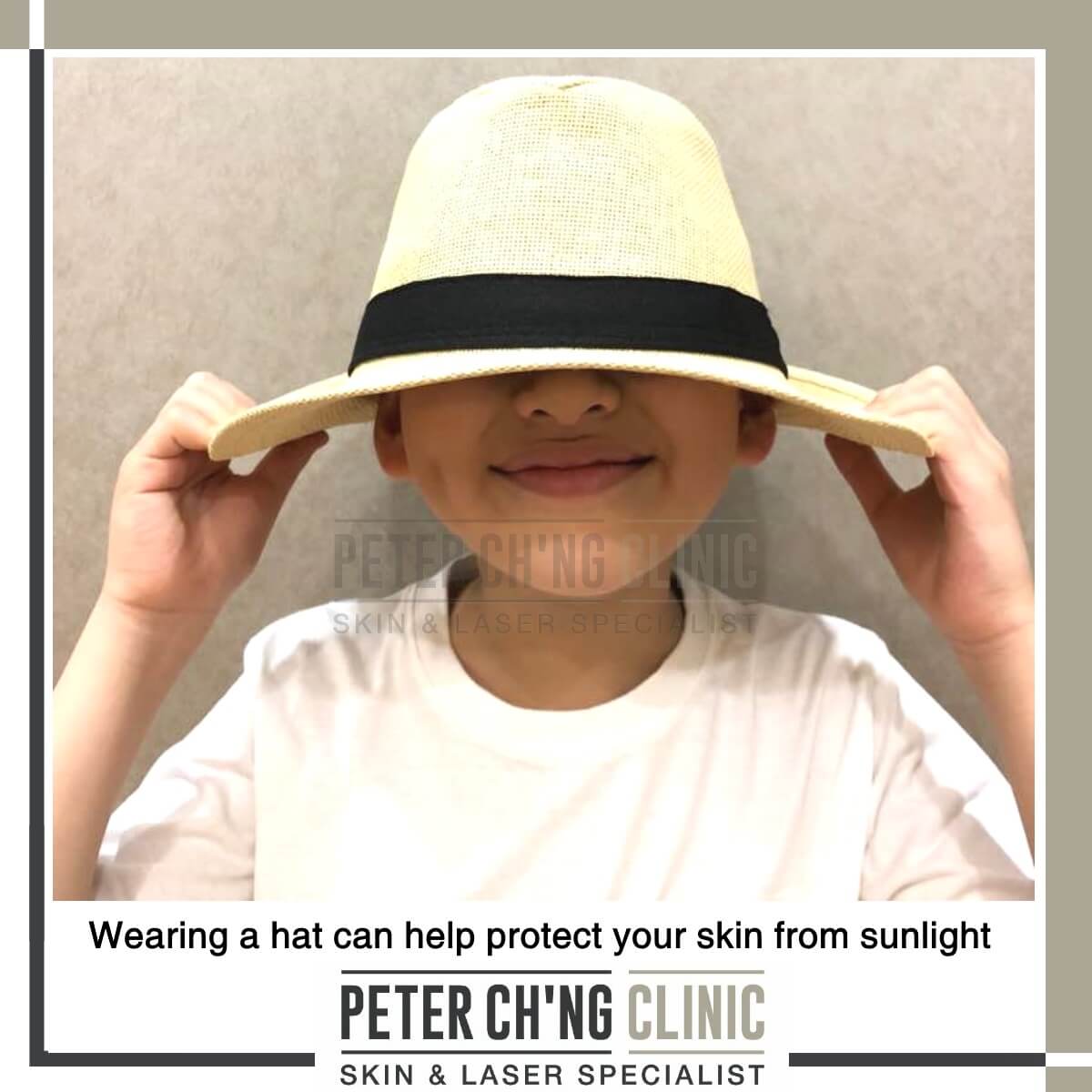
- Wear a broad-brimmed hat to cover not only your face, but also your shoulders. Caps also also fine but they don't help in covering the back of your neck or your shoulders.
- Wear sunglasses to protect your face and eye area when you look up or high into the sky
- Cover up exposed skin area with suitable clothing when outdoors. The heat may discourage you to do so, but exposing your skin to the sun can bring even more severe discomfort later on!
Chemical sunblock
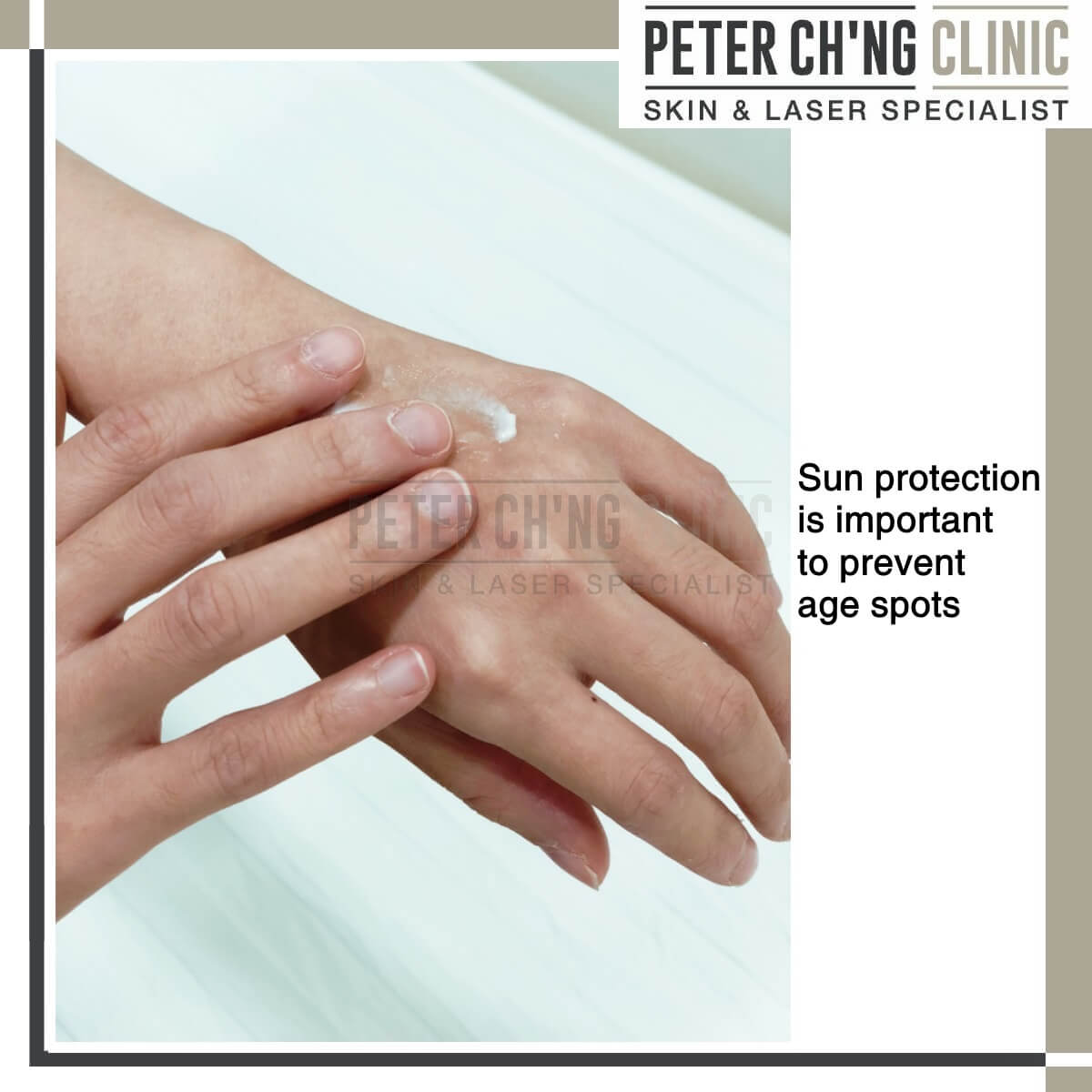
- Use sunscreen or sunblock lotion with SPF of at least 30 or above to protect your skin. If you sweat a lot over your exposed skin or go swimming, reapply from time to time
Treating age spots
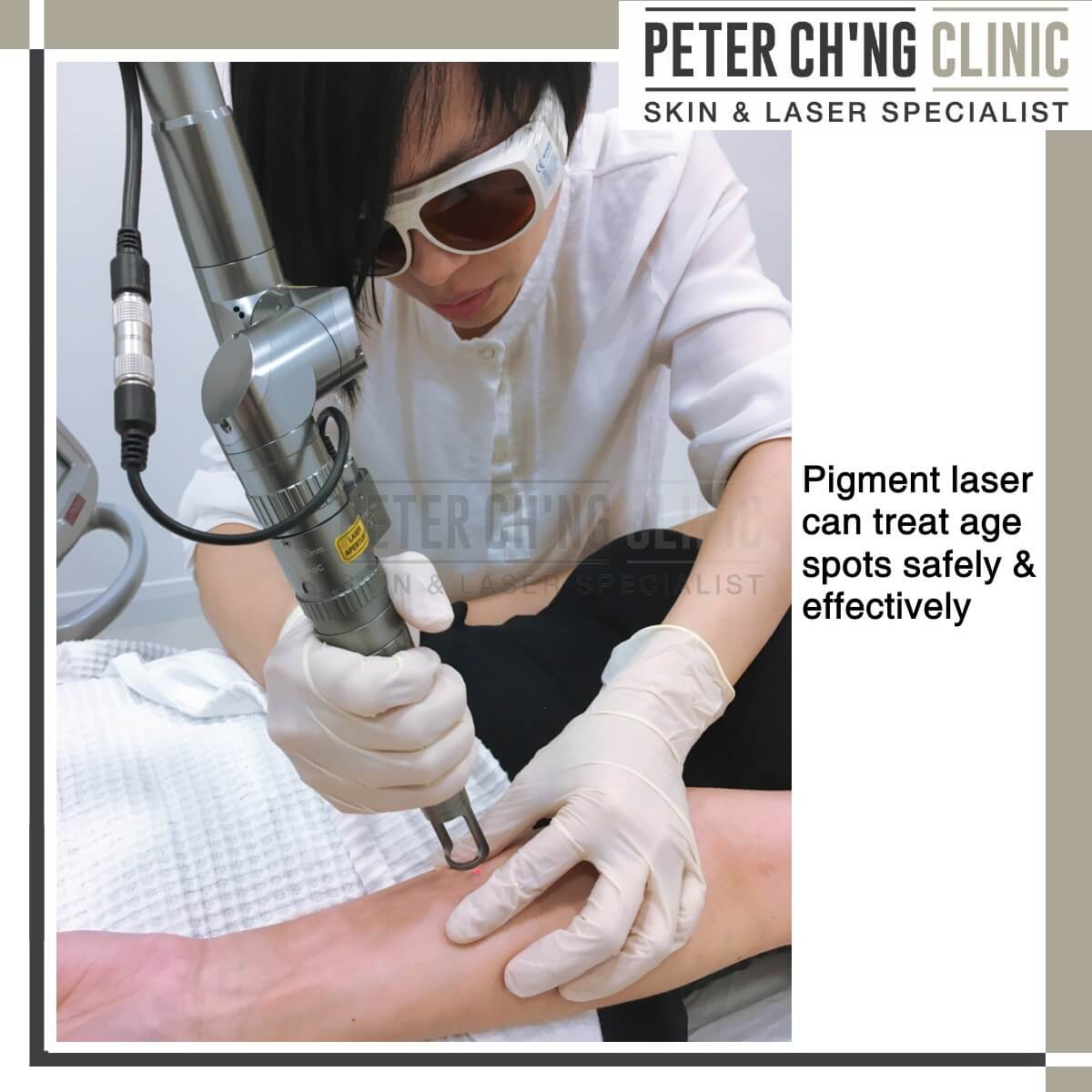
Is there a way to make age spots disappear?
Yes, in fact, there are several different ways in which we can get rid of age spots or liver spots on our skin safely and effectively.
Skin lightening agents
These are lightening agent chemicals that can work on our skin to make pigmentation fade away and lighten our skin tone, especially at the areas where dark pigments of age spots are present.
Some chemicals used as lightening agents are azelaic acid, glycolic acid, tretinoin, and hydroquinone. They are tongue-twisters, and supposedly so because these chemicals should be administered according to the skin condition upon advice from a medical doctor.
Do not attempt to use these chemicals on your skin by yourself or have them done by a non-professional - you risk getting skin damage or worsen your skin condition!
Laser treatments
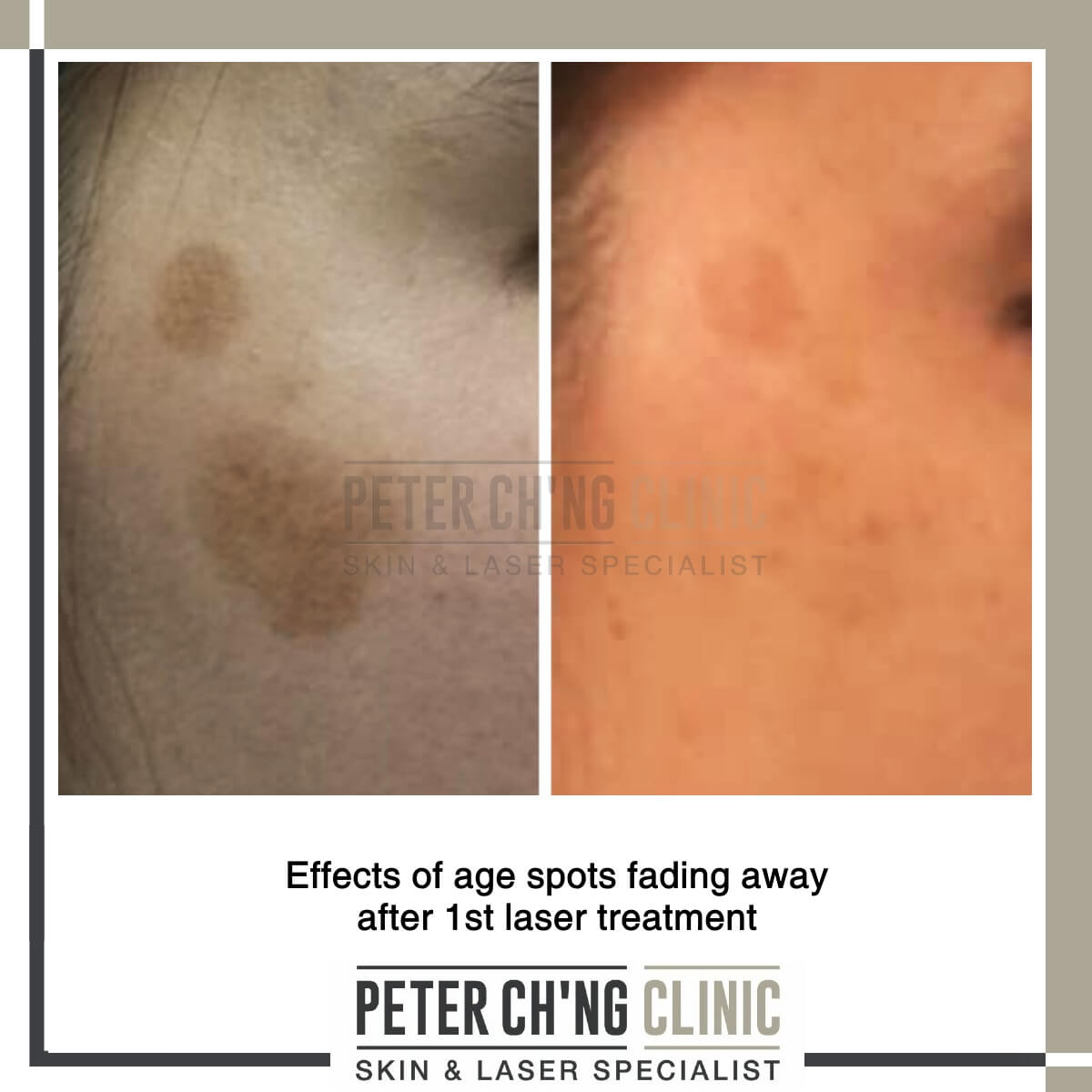
Laser treatments are always one of the most effective treatments to get rid of pigmentation on the skin, and this includes the dark pigments of age spots.
Lasers like pigment lasers can penetrate deep into the skin and remove the pigments beneath the skin to make the spots on the skin surface disappear.
If used by a skilled doctor, the laser can be adjusted to the best and most accurate position to target all the pigments accurately so that the results are precise and satisfactory.
Laser treatments are also quick, painless, and have minimal downtime.
Chemical peel
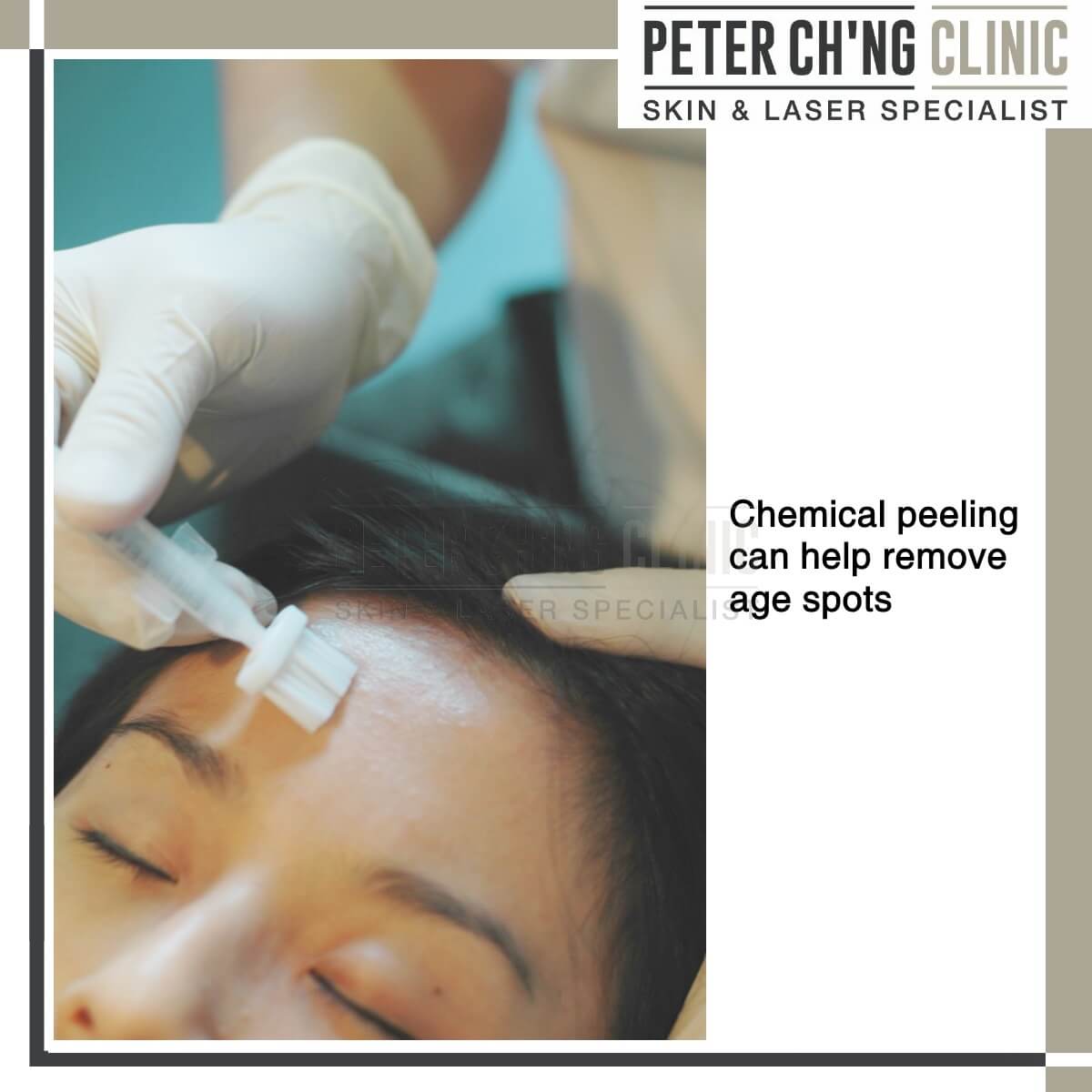
Chemical peel is a simple procedure where the doctor uses acids to apply on the skin area with age spots, causing the skin to peel. Like dotting, we use an icepick to drop acid or medicinal chemicals on the skin to promote skin restoration.
This process stimulates the skin cells around that area to regenerate faster and fasten the healing process of a new layer of skin.
Treatments usually cause scabbing at the spots, and will peel off within 1 week.
Editor's note: Safety should always be our top priority when coming to treatments for our skin. For a safe and effective treatment to get rid of age spots, call us at +6011-22882299, WhatsApp us here, or book an appointment with Dr Loo here!
Taking care of your skin

Once again, it is always a wise move to get a check up on the pigmentation spots on your skin at a skin clinic to make sure that the pigments are harmless.
Any suspicious spots need to undergo a skin biopsy to make sure there are no precancerous or cancerous skin elements present.
Sun protection is very important in taking care of our skin - both in preventing age spots in the first place, and also after treatments to prevent any recurrence.
And finally, beware of unregistered lightening products in the market which may contain high concentration of unapproved ingredients that may cause more harm than good to our skin.
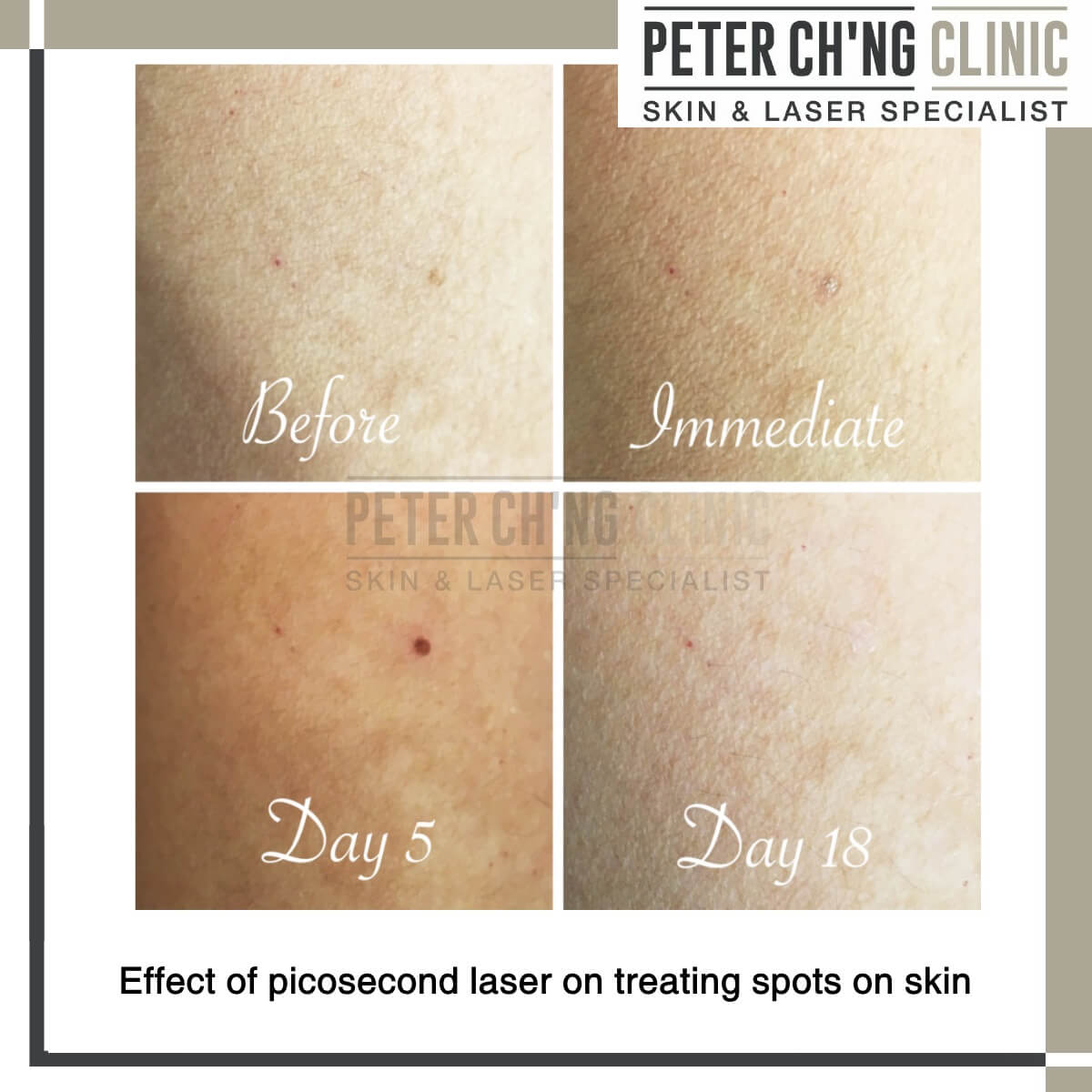
The best course of action is to always get a doctor's advice so that we know what treatment can provide the safest and most effective solution to our skin problems.
Stay tuned next week as we take a closer look at age spots and your daily life.
See ya!
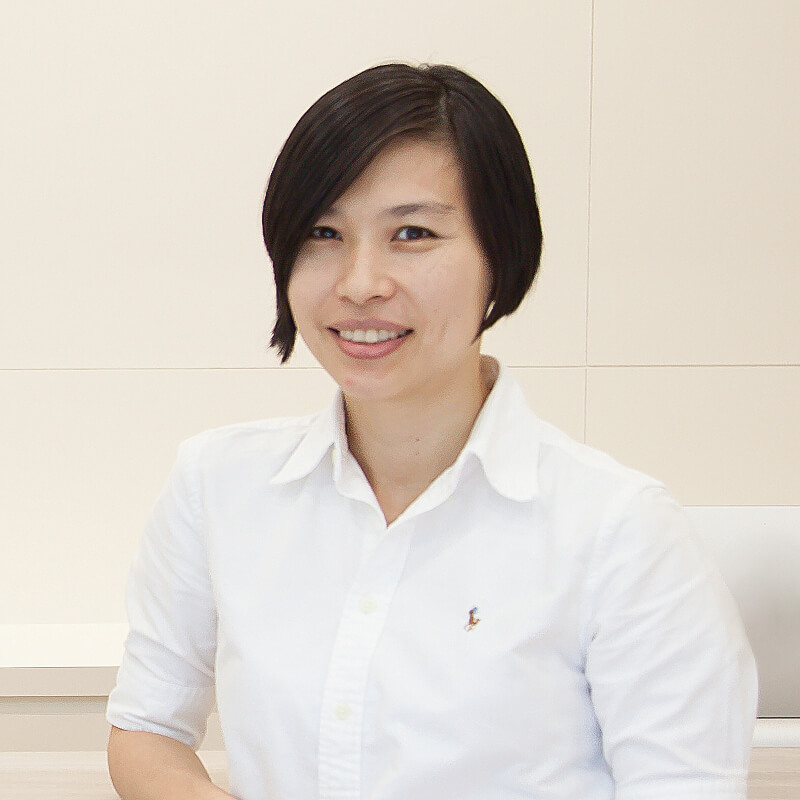
If you’d like to ask more about your skin condition or have a discussion with Dr Loo, call us at +6011-22882299, Whatsapp us, or book an appointment with Dr Loo here!
Treatments mentioned in this article :
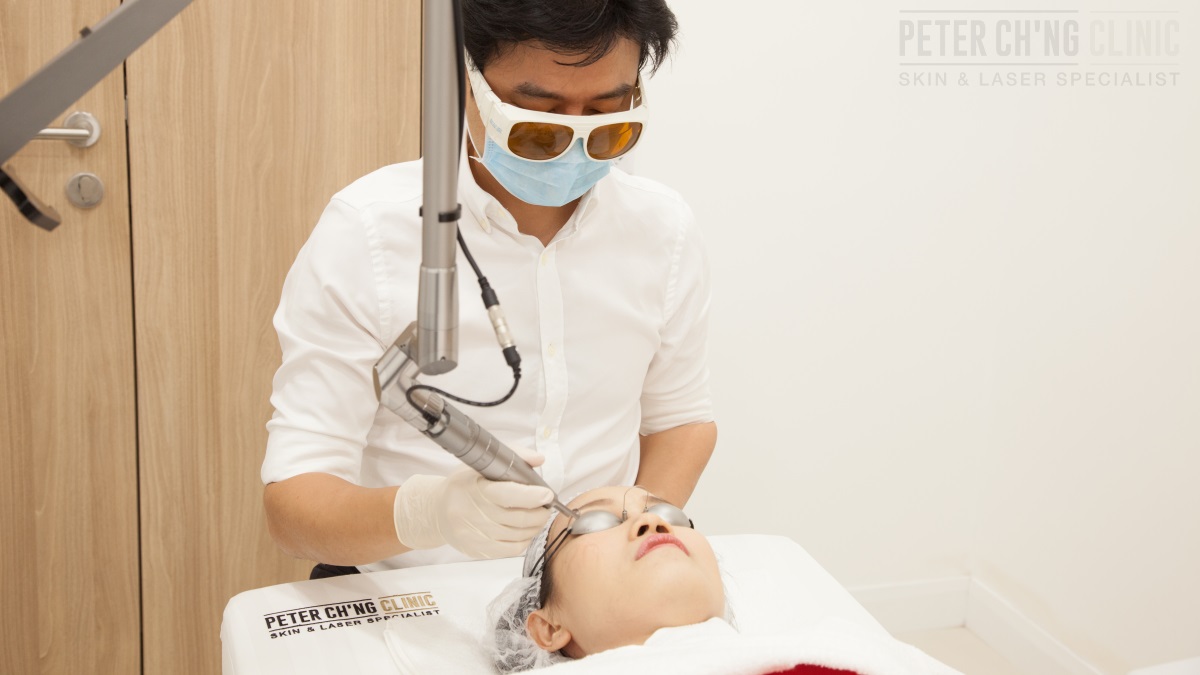
Pigment Laser
Laser treatments are always one of the most effective treatments to get rid of pigmentation on the skin. Pigment lasers can penetrate deep into the skin and remove the pigments beneath the skin to make the spots on the skin surface disappear.
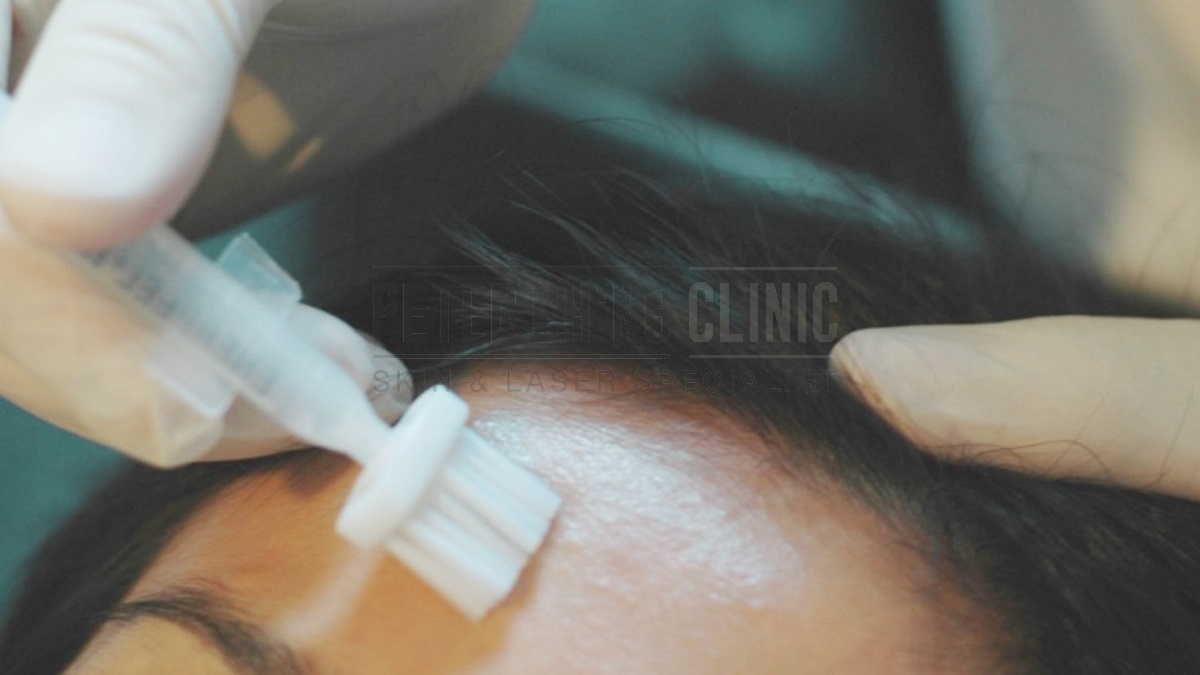
Chemical Peel
Chemical peels are acids that are applied on the skin to cause the skin to peel. This process stimulates the skin cells to regenerate faster and thus fastening the process of skin healing.
